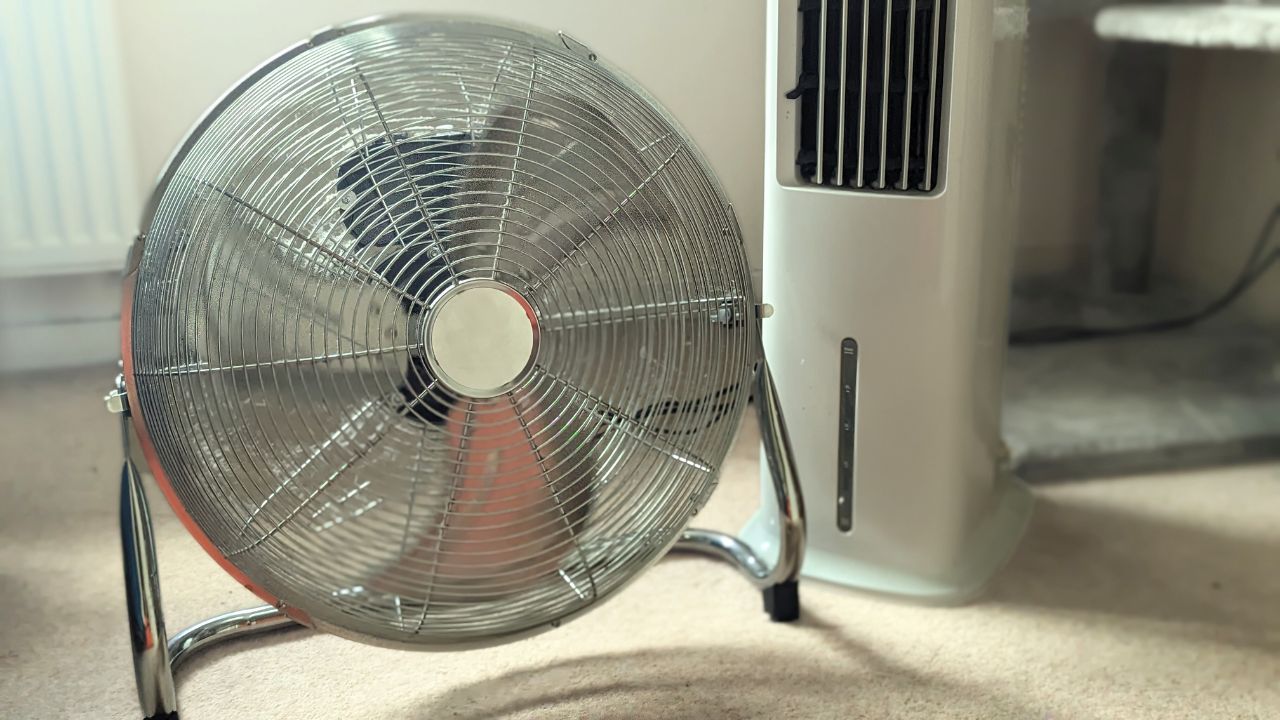It’ll set you back more than £100 in electricity to use an air conditioner over the summer
When temperatures are high, we’re all looking for a way to stay cool. And you wouldn’t be alone in considering whether it’s worth getting an air conditioning unit.
We’ve compared a selection of fans, air coolers and air conditioners to determine how they compare to each other, from which one cools you down the best to which one costs the least to run.
Some articles on the site contain affiliate links, which provide a small commission to help fund our work. However, they won’t affect the price you pay or our editorial independence. Read more here.

Fan vs air con: which cools you down best?
Fans are a firm favourite in cooling ourselves down in the summer, but they don’t really cool down the room.
This is because a fan pulls in air from the back and blows it out of the front. On particularly hot days, this means it is effectively blowing around hot air, but the airflow does help moisture on your skin evaporate, making you feel a little cooler.
Air conditioners are much more expensive than fans. There’s now a good selection of “portable” options on the market, setting you back less than £500.
These actually cool down the air that feeds through it. This lowers the temperature of the room, making a heatwave considerably more comfortable.
Another option is an air cooler. These cool the air using cool water and ice packs, with a system called evaporative cooling, which we explain below.
An air cooler works using evaporative cooling. You fill the tank with water and ice packs and the cooler will run the hot air over the water, causing it to evaporate.
The water takes heat from the air when it evaporates, and this air is then blown from the air cooler. We’ve explained a cheap hack to do this with an ordinary fan below.
Fan vs air con: how do prices compare?
There are two costs to take into account: the initial cost and the cost to run.
Air conditioner units tend to cost a fair amount more than a typical fan, setting you back at least £200 initially, and going up to more than £1,000.
An air cooler costs an average of £90, ranging from £50 to £120.
Meanwhile, you can get a fan for less than £50. However, a couple of well-known brands (looking at you, Dyson), will set you back upwards of £300.
Do you get what you pay for?
The real question is: is there any point in spending a bunch of extra money on a fan? Does it make any difference?
Last year, Tech Advisor deemed the Dyson to be the best of the bunch due to the stylish design and lack of noise, but it stresses that this is if “budget is no issue”, suggesting that the £350 price tag could be a turn-off.
Personally, I don’t mind an ugly fan if it does the job. Thanks to our lovely British weather, it’s not as if it spends a great deal of time out on display.
To ensure you’re getting what you pay for, make sure you consider the size. Larger fans will be able to create better airflow but may be noisier. If you’re a light sleeper, you might prefer one known for being quiet or one with night mode (this creates a sort of soothing rhythm that sends you to sleep).
You could also consider the number of speed settings, whether it oscillates and whether there’s an energy-saving mode.
Fan vs air con: how much do they cost to run?
There’s no use buying an air conditioning unit if you’re terrified to turn it on with the fear of your electricity bills skyrocketing.
Of the three, fans are the cheapest to run, costing an average of about a penny per hour. Air coolers cost a little more, averaging at 2.5p per hour. Meanwhile, an air conditioning unit would cost an average of 31p per hour.
Running for 8 hours per day in June, July and August would set you back an average of £8.41 for using a fan, £18.31 for using an air cooler and a whopping £230.40 for using an air conditioning unit.
Here are the cheapest of the three categories for the combination of their initial price, based on the price at Currys at the time of writing, and the cost of electricity for three months in the summer – this assumes that you’ll use your fan or air conditioner for 8 hours per day for three months based on the July 2025 price cap.
| Name | Type | Price | 8 hours per day for summer | Combined cost |
| Status 14″ Tower Fan | Fan | £19.00 | £7.57 | £26.57 |
| Status 16″ Pedestal Fan | Fan | £19.99 | £7.57 | £27.56 |
| Beldray 3-in-1 LED Cordless Fan | Fan | £24.99 | £1.70 | £26.69 |
| Tower T669004 Air Cooler | Air cooler | £49.00 | £12.31 | £61.31 |
| Beldray EH3187 6 Litre Portable Air Cooler | Air cooler | £59.99 | £12.31 | £72.30 |
| Salter EH3723 3-in-1 Air Cooler, Purifier & Humidifier | Air cooler | £64.99 | £12.31 | £77.30 |
| Daewoo COL1317GE 7000 BTU Portable Air Conditioner | Air Conditioner | £220.00 | £148.66 | £368.66 |
| Igenix IG9907 Air Conditioner & Dehumidifier | Air Conditioner | £249.00 | £148.66 | £397.66 |
| Russell Hobbs RHPAC3001 3 in 1 Portable Air Conditioner | Air Conditioner | £279.00 | £147.71 | £426.71 |
Get the best of our money saving content every week, straight to your inbox
Plus, new Quidco customers get a high paying £18 welcome offer

How to pay less for your fan or air conditioner
Other than simply shopping around, which includes checking a few different sites for the best price and availability, there are a couple of other things you can take into consideration but may require planning ahead.
1. Choose the right time to buy one
Of course, the moment there’s a suggestion that we’ll expect some hot weather, most people will rush out to buy themselves a fan, air cooler or air conditioning unit. As a result, you won’t have much of a chance to compare prices and find the best deal.
The best thing to do is think ahead for next year and buy one at the end of summer — shops will have surplus stock with nowhere to store it, so you can expect to get a discounted price.
 Featured switching deal
Featured switching deal
 Customer rating
3.8/5
Customer rating
3.8/5
- Switch bonus£200
- Offer endsUnknown
- FSCS Protected? Yes
- Bonus requirements Switch using the Current Account Switch Service and close your old account within 60 days of starting the switch
- Deposit requirements Deposit £1,500 in the first 60 days from opening the account
- Direct debits transferred over Set up two Direct Debits before or after the switch from a selected list of household bills
- Existing customers? Can't have held any Santander current account on 1 January 2025
- Restrictions Can't have received a switching bonus from Santander already, offer limited to once per person
- Eligible accounts Open a new or hold an existing Everyday, Edge, Edge Up or Edge Explorer current account
2. Use price trackers
Price trackers can tell you how the price of a product has changed over time over different retailers.
This lets you find the best price right now as well as see whether a cheaper price has been available before – see if you can work out trends with this, such as based on the time of year or during shopping events.
PriceSpy is a pretty good one. You’re able to set price alerts for when prices drop below a certain amount, determined by you. You can also only receive notifications if the item is actually in stock and from specific retailers or retailers with good ratings.
We have a guide to price trackers that gives some more information on how to grab the best deal.
3. Hold out for the sales
Buying a fan on Amazon Prime Day, during Black Friday week or in the January sales could be a good way of getting a little extra off. It’s worth using in tandem with price trackers, as items often look a lot more discounted than they really are.
But don’t assume you’re getting a real discount in these sales. Have a look at the price history for the one you want to work out if the sale price is actually a good price.
Cheap hacks to enhance your fan
Your room will be cooler if you keep your curtains closed during the day, to block the sunlight from getting in. There are also a couple of ways to make your fan work a little better.
The first method is to point a fan out of the window (yes, really!). This blows the hot air out of the room. You can then place a second fan inside the room pointing towards the other one to create a crosswind.
If you have ice or ice packs handy, you can place them in a tray in front of your fan in order to create a makeshift AC. This works in a similar way to the air cooler, which will cool down the air that your fan is blowing towards you.
If you’re lucky enough to have a power socket in your garden, you could also take your fan outside where the air is a little cooler, giving yourself a refreshing breeze. Pair it with a cold drink and a great book and you’ve got yourself a cool afternoon outside.







Hot temperatures make me ill due to inflammatory arthritis — I did the research and ended up with a German made Midea air-con unit for just under £400 which is used in my bedroom. The air conditioner lowers humidity as well as air temperature which is an important consideration for choosing it over fans. I am finding that we don’t have that many extremely hot days; I use it with care and for me, the cost is therefore negligible. I don’t think it will cost me more than £50/year to run. The air conditioner has a remote and can also be managed by your phone using wifi which makes it easy to keep costs down too. I set the temperature at 20 degrees — there is no reason to turn the room into a refrigerator. Beware that it is quite noisy as a portable air conditioner has the compressor inside the room with you (I use ear plugs while I am sleeping). Honestly, for anyone who is suffering with summer heat this is a no-brainer — BUY the air conditioner and then use it with care (I use fans for normal hot days). I am sorry for the impact on the environment, but my energy contract is green. I also have installed thermal blinds throughout my house and keep them down 24/7 during hot days — another critical way to cool the house.
I spent ages looking into this earlier this year. I wanted a portable aircon but you have to have suitable windows to vent it, and I don’t. They tend to be designed for the American market. For the size of room, I was looking at around £650 for a portable device with enough capacity. In the end I gave up on that and used a local aircon company to install a proper air conditioner at a cost of approx £1500. The downside is the big fan that sits outside my house. That’s okay if you can site it somewhere private where it’s out of the way. In my case it’s visible from a public road, sadly. Still – the AC is great in hot weather, if you don’t mind cold draughts.